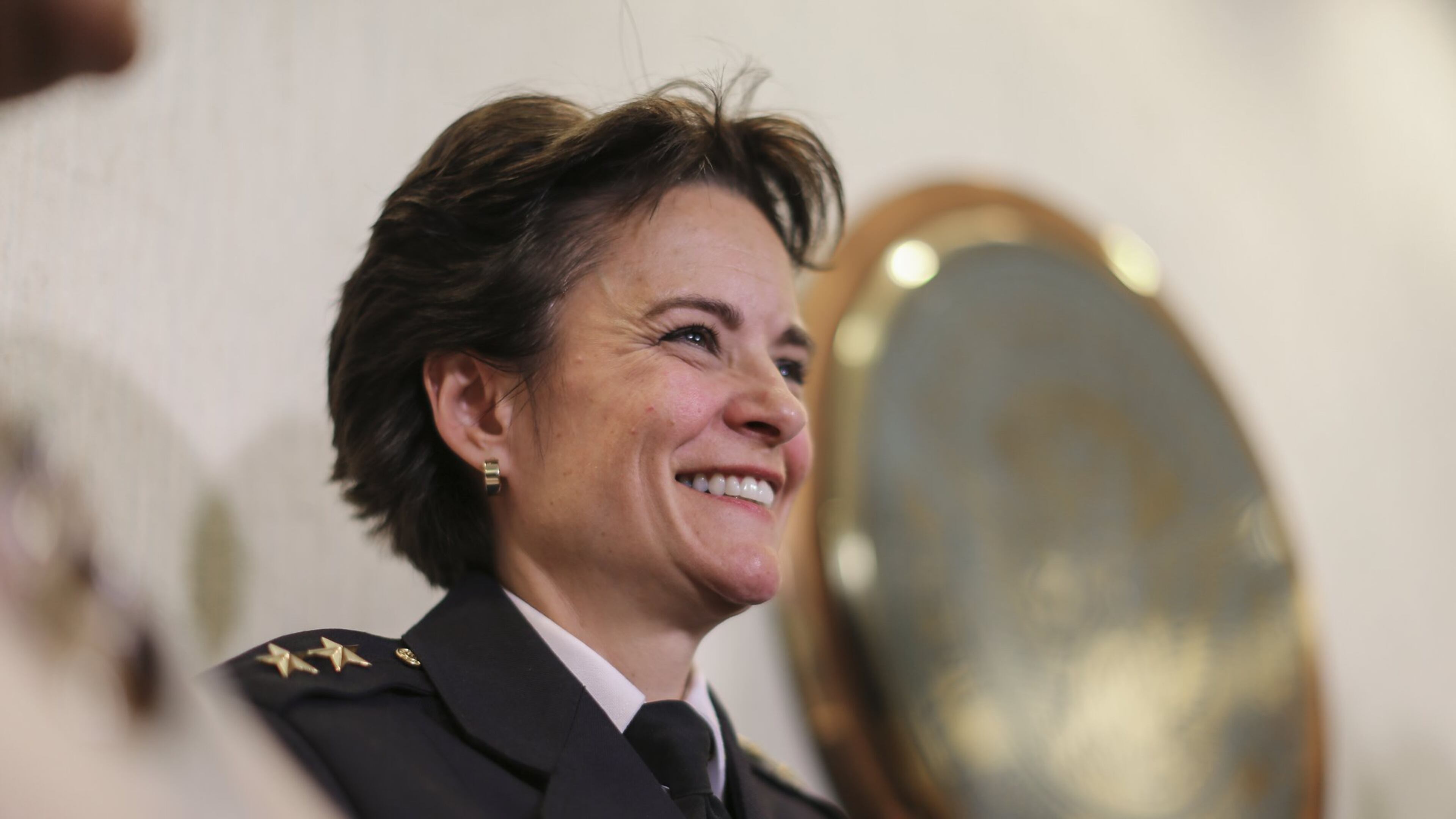Former APD chief Shields speaks out on her exit, Rayshard Brooks, new job

Former Atlanta police chief Erika Shields spoke out Wednesday for the first time on her decision to leave the department, telling reporters she feared she would be a “distraction” if she remained on the job.
Shields’ surprise decision to step down from the job last summer came one day after Rayshard Brooks was killed following an aggressive confrontation with Atlanta police officers Garrett Rolfe and Devin Brosnan. Brooks, suspected of DUI, was shot twice from behind by Rolfe after resisting arrest and trying to flee with Brosnan’s Taser, which he had aimed at the officers.
“Rayshard Brooks was a tragedy. It was awful,” said Shields, introduced Wednesday as chief of the Louisville Metro Police Department in Kentucky. Many in APD believed Shields was forced out after objecting to Mayor Keisha Lance Bottoms’ decision to fire Rolfe without an investigation.
“What I recognized is there were multiple issues at play, even before that, but it culminated with Rayshard’s killing,” Shields said Wednesday. “It would’ve been self-serving to stay at that point.”
It’s unclear if she was referring to Rolfe when she said “we have to shift our focus away from ... allowing officers to be judged on that one snippet of an incident. We must hold our people accountable for the decision-making from the get-to to the very end.”
In Louisville, Shields takes over a department roiled by controversy. Last March, three white Louisville Metro cops, having obtained a no-knock warrant, entered the home of Breonna Taylor, a 26-year-old African-American ER technician, as part of an illegal drug investigation. Taylor’s boyfriend, who said he thought the police were intruders, fired one warning shot. The officers responded with a flurry of bullets, six of which struck Taylor. There was no evidence she was involved in any criminal behavior.
“I think it does an injustice to Breonna Taylor to say they were similar incidents,” Shields said. “They were not. She was asleep in her bed.”
Louisville police Chief Steve Conrad, facing widespread criticism for the department’s handling of the case, was fired June 1 after the fatal shooting of black business owner David McAtee during a local protest against excessive force by police.
Some activists in Louisville were quick to criticize Shields’ appointment.
“In Louisville, we are dealing with the murder of #BreonnaTaylor,” tweeted poet and protester Hannah Drake. “You know what my city decided to do? Hire (Erika) Shields as the new police chief. Yes, that (Erika) Shields, the police chief that resigned after the murder of Rayshard Brooks. PRAY MY DAMN STRENGTH!”
Amy Hess, chief of public safety for Louisville Metro Police, said Shields was chosen from a field of 28 candidates, including 11 current or past chiefs. She was recommended by the Police Executive Research Forum, a Washington D.C.-based consulting firm that is leading a top-down review of APD training and policies.
PERF’s executive director, Chuck Wexler, told The Atlanta Journal-Constitution in June that Shields was “just the kind of chief I’d be looking for if I was leading the search for Atlanta.”
Rodney Bryant has served as APD’s interim chief since Shields stepped down. Bottoms says she delayed a national search for a new chief because several other municipalities were also looking for new police leadership.
Shields had remained on the city payroll. She served as deputy chief information officer, where she managed public safety initiatives for Atlanta Information Management.
The second female and first openly gay police chief in Atlanta’s history, Shields steadily worked her way up the department ladder, serving as a patrol officer, sergeant, lieutenant and major prior to her appointment to deputy chief. She was named chief in 2016, promising reform and vowing not to shy away from tough decisions.
Last January, Shields received criticism from officers and citizens alike after she halted police chases in most circumstances following a series of deadly incidents. The risk to innocent civilians was just too great, she said.
“Please know that I realize this will not be a popular decision; and more disconcerting to me personally is that this decision may drive crime up,” Shields said in a memo to the department announcing the change. “I get it.”
That policy was rescinded just last week. Officers can now engage in a vehicular pursuit when “they have direct knowledge” that the fleeing suspect has committed or attempted to commit a “forcible felony” and that the suspect’s escape poses imminent danger, according to a statement from APD.


